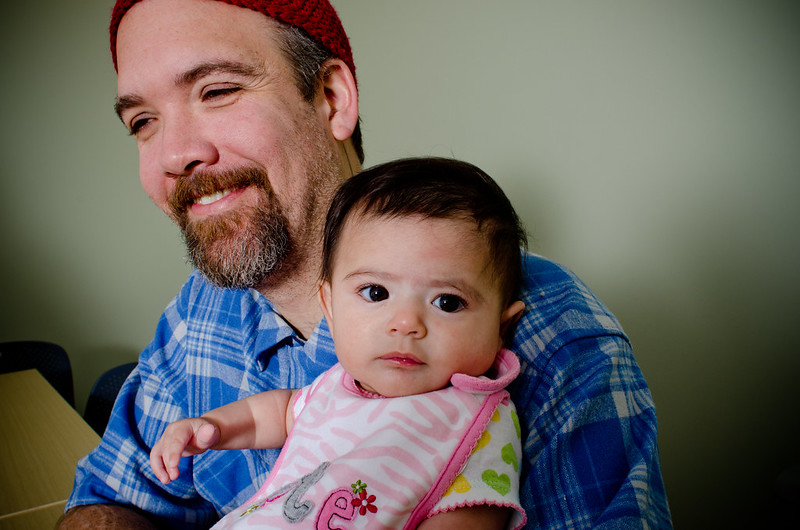November 18, 2021
Two years ago, only three families would show up at the monthly Parents as Teachers group meeting in Southeast Los Angeles. And that was on a good day. Often just one or two families attended. Today, 18 families are regular participants. What changed? Meetings are now held online.
“Online has helped us reach more families,” said Ruby Velasco, home visiting program manager for the Human Services Association in Bell Gardens, a First 5 LA grantee. “It’s really been much more effective.”
If there’s a silver lining to the COVID-19 pandemic, it includes online video platforms that enable more parents to participate in home visiting programs. First 5 LA’s home visiting grantees are seeing higher attendance numbers overall and greater participation by fathers, as well as increased ability to serve clients with specific needs such as interpreters.
“Online has helped us reach more families. It’s really been much more effective.” – Ruby Velasco, home visiting program manager for the Human Services Association in Bell Gardens
“Home visiting has really been a success online,” said First 5 LA Family Supports Senior Program Officer Maria Aquino, who works with home visiting grantees. “It’s allowed for more flexibility for scheduling. It’s a time saver and it encourages the whole family to join.”
 Home visiting is a cornerstone of First 5 LA’s mission to have all children school-ready by age 5. Numerous studies have documented that home visiting improves parental attitudes, prevents child maltreatment and neglect, increases cognitive, social and language development, and reduces illness and injury.
Home visiting is a cornerstone of First 5 LA’s mission to have all children school-ready by age 5. Numerous studies have documented that home visiting improves parental attitudes, prevents child maltreatment and neglect, increases cognitive, social and language development, and reduces illness and injury.
To provide home visiting services, First 5 LA partners with agencies in 14 low-income communities around Los Angeles County. Healthy Families America (HFA) is another First 5 LA-funded home visiting program that provides services until the child turns 5. Parents who are in greater need of support (as determined by an assessment by the Welcome Baby program at the hospital) are encouraged to accept a referral to Parents as Teachers (PAT) or Healthy Families America (HFA), depending on the community where they reside. Parents who need less support are provided the option of Welcome Baby only. TCC Family Health is an HFA Program.
“Home visiting has really been a success online. It’s allowed for more flexibility for scheduling. It’s a time saver and it encourages the whole family to join.” – First 5 LA Program Officer Maria Aquino
As part of the PAT program, parents attend a monthly Group Connections meeting designed to foster a sense of community among parents and give children constructive playtime with activities. But with work, traffic and lack of transportation, it was tough for many parents to attend the daytime meetings. After the pandemic broke out last year, agencies moved Group Connections meetings online. They were pleasantly surprised at the results, especially given the bumpy start to onboarding staff and clients on devices and platform software.
“It’s turned into a time for their families to bond together,” said Anna Ybarra, home visiting program supervisor at Human Services Association. She added that the older brother of an infant in the program enjoys the sessions so much that he gave them the nickname “Fun Fridays,” which the agency now uses as a slogan for their meetings.
The online sessions have become quality family time, said PAT participant Madhaí Meza, mom of 13-month-old Isaac. Meza said her eight-year-old brother also loves to participate in the activities, which include reading stories, making crafts, dancing and singing. Home visitors drop off materials for activities beforehand during contactless visits to the families. “It really has its benefits,” Meza said. “I’m connecting more with my son, and my brother is a role model for Isaac.”
Agencies report similar scenarios across the county, Aquino said. With online platforms, home visitors can more easily schedule Group Connections and regular visits in the evenings, which means many more dads can attend. “It’s always been: ‘How can we engage the fathers?’” Aquino said. “Now we have a way.”

Online platforms also proved useful when Long Beach grantee agency TCC Family Health had a Sudanese mom in the Welcome Baby program who spoke limited English. She requested an Arabic interpreter familiar with the dialect spoken in her home country.
The agency called Language Line Solutions, an online interpreter service, and found a Sudanese interpreter. While home visitor Latreece Oliver speaks to the mom on the video platform, a three-way phone call connects them to the interpreter, whose agency is not yet capable of handling video calls.
“It took a lot of figuring out,” Oliver said, adding that once they set up the system, she’s been able to help the client navigate parent-teacher conferences, enroll her older children in school and even schedule and prepare for a visit to the dentist.
The same system was used recently with a mom from Haiti who requested a Creole interpreter, said Markisha Hill, home visiting program supervisor at TCC Family Health. Using a combination of phone and online video, they were able to connect the mother with an interpreter who helped them enroll the mother in WIC and connect her to other resources.

First 5 LA Family Supports Senior Program Officer Maria Aquino
The online platforms are popular with home visitors as well as clients. Aquino noted that online visits mean less driving through traffic, hunting for parking spots in dense residential neighborhoods, and walking alone on dark streets during winter months.
When the pandemic ends, home visitors say that they’d like to come up with a model that mixes online sessions with in-person visits so they can combine the advantages of both.
“We’ve been advocating for a hybrid model,” said First 5 LA’s Aquino. “Still, there’s no replacement for one-on-one interaction.”
To find out more about virtual home visiting, check out our other stories: Virtual Home Visiting in Action: An Inside Look and How First 5 LA Ensured Home Visits Continued Virtually, Yet Tangibly.









